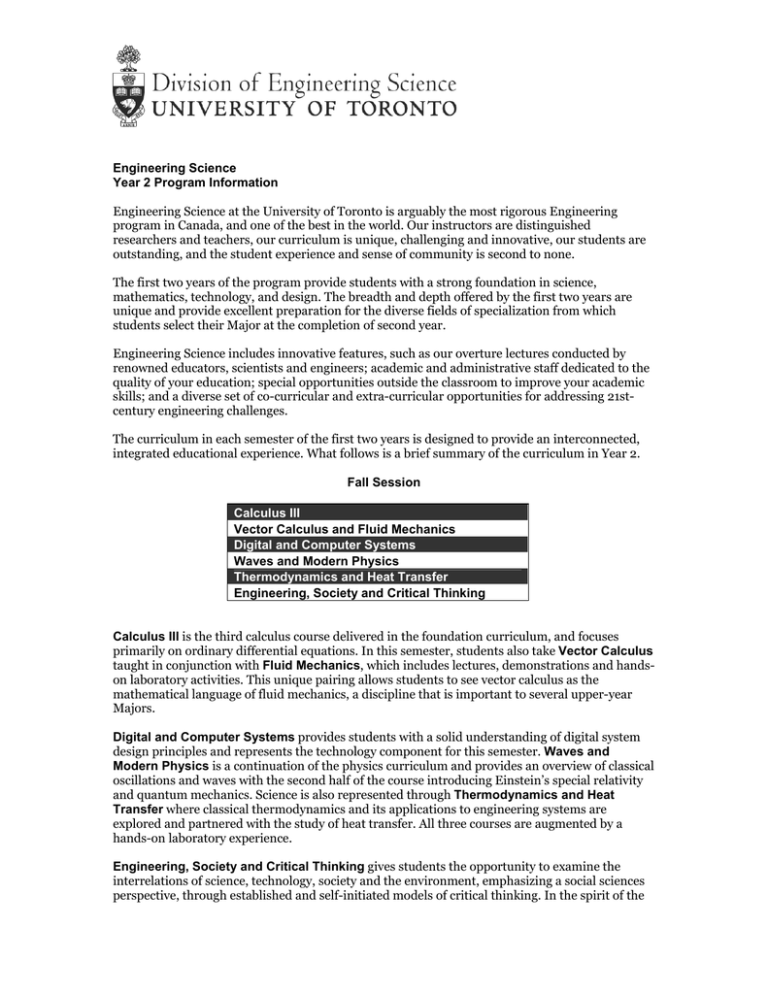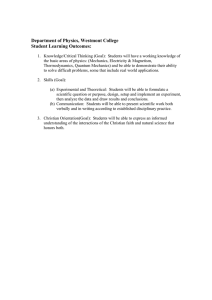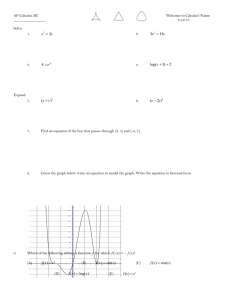Engineering - Division of Engineering Science
advertisement

Engineering Science Year 2 Program Information Engineering Science at the University of Toronto is arguably the most rigorous Engineering program in Canada, and one of the best in the world. Our instructors are distinguished researchers and teachers, our curriculum is unique, challenging and innovative, our students are outstanding, and the student experience and sense of community is second to none. The first two years of the program provide students with a strong foundation in science, mathematics, technology, and design. The breadth and depth offered by the first two years are unique and provide excellent preparation for the diverse fields of specialization from which students select their Major at the completion of second year. Engineering Science includes innovative features, such as our overture lectures conducted by renowned educators, scientists and engineers; academic and administrative staff dedicated to the quality of your education; special opportunities outside the classroom to improve your academic skills; and a diverse set of co-curricular and extra-curricular opportunities for addressing 21stcentury engineering challenges. The curriculum in each semester of the first two years is designed to provide an interconnected, integrated educational experience. What follows is a brief summary of the curriculum in Year 2. Fall Session Calculus III Vector Calculus and Fluid Mechanics Digital and Computer Systems Waves and Modern Physics Thermodynamics and Heat Transfer Engineering, Society and Critical Thinking Calculus III is the third calculus course delivered in the foundation curriculum, and focuses primarily on ordinary differential equations. In this semester, students also take Vector Calculus taught in conjunction with Fluid Mechanics, which includes lectures, demonstrations and handson laboratory activities. This unique pairing allows students to see vector calculus as the mathematical language of fluid mechanics, a discipline that is important to several upper-year Majors. Digital and Computer Systems provides students with a solid understanding of digital system design principles and represents the technology component for this semester. Waves and Modern Physics is a continuation of the physics curriculum and provides an overview of classical oscillations and waves with the second half of the course introducing Einstein’s special relativity and quantum mechanics. Science is also represented through Thermodynamics and Heat Transfer where classical thermodynamics and its applications to engineering systems are explored and partnered with the study of heat transfer. All three courses are augmented by a hands-on laboratory experience. Engineering, Society and Critical Thinking gives students the opportunity to examine the interrelations of science, technology, society and the environment, emphasizing a social sciences perspective, through established and self-initiated models of critical thinking. In the spirit of the humanities and social sciences, students are evaluated through writing, participation, and facilitation of discussion seminars. Winter Session Engineering Design Probability and Statistics Quantum and Thermal Physics Electromagnetism Systems Biology Complementary Studies Elective In the winter semester, students take Engineering Design where they engage in a full mechatronics design experience, designing and building a functional autonomous robot. Formal design instruction in this course builds on the design theory and skills learned from the earlier Praxis courses and provides an intense capstone experience to the design education in the foundation years. Probability and Statistics completes the mathematical studies in the foundation curriculum and provides students with a comprehensive overview in both areas, reflecting on relevant case studies in engineering contexts. All upper-year Majors will take advantage of the knowledge gained in this course and many students use what they learn in the course during their fourth year thesis. Quantum and Thermal Physics provides a continuation of quantum mechanics from the previous semester. The second half of the course provides an introduction to the basic ideas of classical statistical mechanics and radiation with applications to experimental physics. This course completes the strong physics component in the foundation years and includes a laboratory component for exploratory learning. Electromagnetism provides students with an understanding of electromagnetic phenomena from both a science and an engineering perspective. Systems Biology introduces students to concepts in cell biology and physiology, and through a problem-based learning approach the course demonstrates the use of biological understanding in engineering applications. Course concepts are highlighted by a series of laboratory activities where students have an opportunity to design their own experiment. A complementary studies elective course gives students an opportunity to explore an area of interest to them outside of engineering in the humanities and social sciences.


